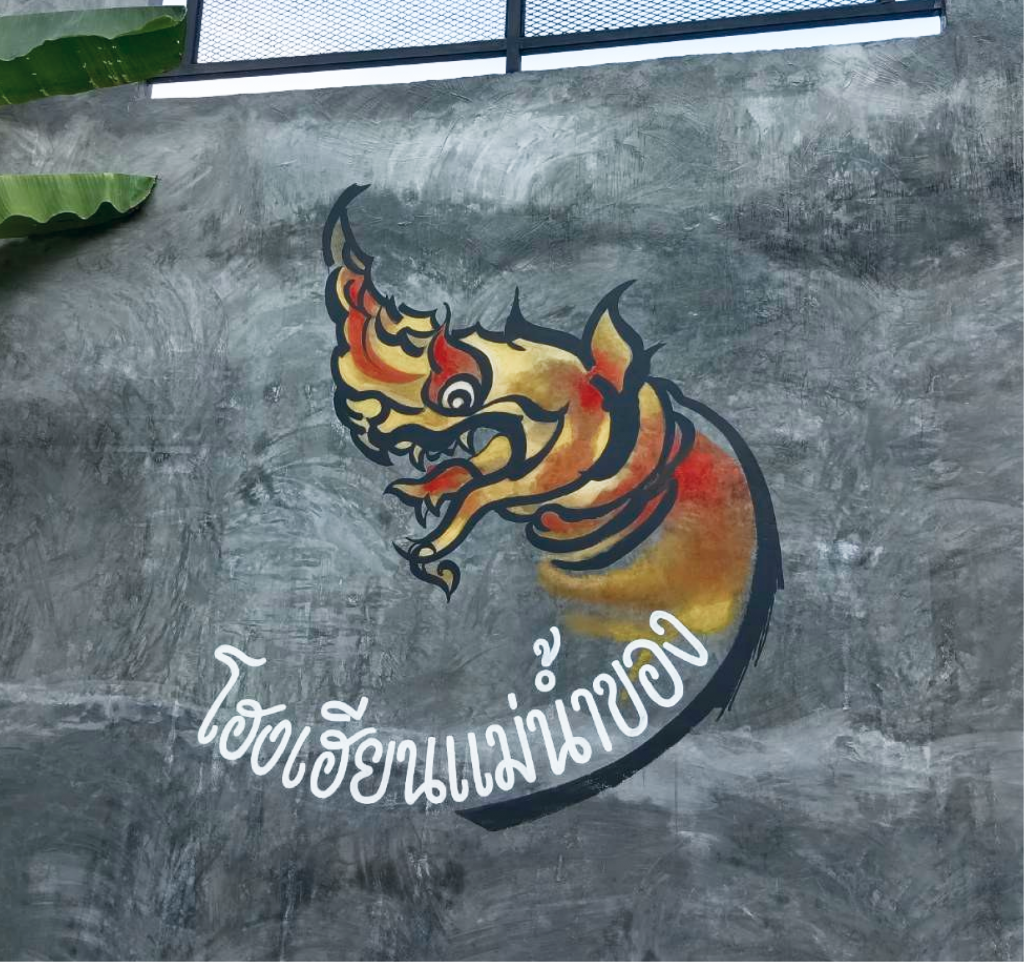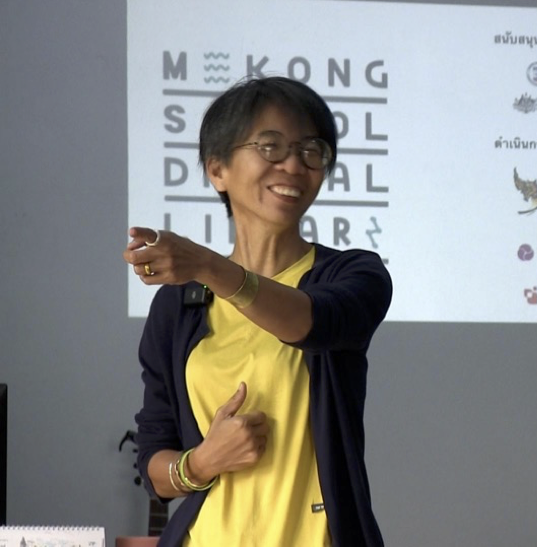These are the people who make our program possible
Background
The Mekong School: Institute of Local Knowledge was established on 18-19 December 2015 by the Rak Chiang Khong Group in order to enhance the work of The Mekong-Lanna Natural Resources and Cultural Conservation Network, and to serve as a platform to study and monitor changes caused by developments in the Mekong River Basin.

The Mekong School creates a learning process for working on issues regarding natural resources, environment, and culture in the Mekong River Basin. Our work takes the form of a "field of learning"; by using collaborative learning and developing our work processes, we develop "substantial areas" where we apply both local knowledge of the ecological, cultural, and historical aspects of our working area together with scientific knowledge.
We seek to strengthen our participatory learning process by including both local and external people to analyze, exchange knowledge and formulate guidelines for selecting development policies that affect local natural resources and culture. We coordinate cooperation with civil society network partners to participate in the formulation of development guidelines at the local, national and regional levels in the Mekong River Basin.

Our philosophy has two bases; respect for nature, and faith in human equality. In our enaction of this philosophy, the two main strategies at work are fighting and building. We fight by collaborating on direct action campaigns to protect the Mekong River, and we build by organizing the community to build local resiliency through our research, training programs, public communication, and policy advocacy.
“The Mekong School is a learning platform for both local and global learning to research environmental changes and the impacts of development in the Mekong River Basin, and to strengthen local communities in the preservation and management of natural resources, environment, and local culture of the Mekong River Basin. We do this through conducting training in research and publishing the local knowledge and scientific knowledge to our working group that includes children, youth, villagers, communities, students, educational institutions, local organizations, civil society, and the general public.”
Meet Our Team

Mr. Niwat Roykeaw is known locally as Khru-Tee (Khru means teacher in Thai). He is the Chairperson of Chiang Khong Conservation Group and the Director of Mekong School: Institute of Local Knowledge. He grew up and attended primary and secondary school in Chiang Khong District and high school in Chiang Rai Province before receiving his bachelor’s degree from Chiang Mai University in 1982.
Khru-Tee began his teaching career at Chiang Rai Teachers College, and is a certified teacher under the Ministry of Education. He taught the children of various highland schools in Chiang Rai Province from 1983 to 1990. From 1990 to 1997 he was the headmaster at Montri Wittaya School, Ban Houy Ku School, and Ban Song Pee Nong School in Chiang Rai. For his dedication to public education access in underserved rural areas, Khru-Tee has received a Dedicated Teachers Award from the Teachers Council of Thailand.
In 1995, Khru-Tee and his colleagues in Chiang Khong founded the Chiang Khong Conservation Group (Rak Chiang Khong) to address the drought problem in the Som River, a local tributary of the Mekong River. The Hmong villagers were being blamed for deforestation and the seasonally dewatered stream. The project solicited funding from local citizens, businesses, and organizations to buy trees for Hmong communities, and as a result, water returned to the stream and the group now teaches local communities to maintain their forests and rivers. In 2002, Khru-Tee co-founded Mekong Lanna Natural Resources and Cultural Network to empower local communities along the Mekong, Ing, and Kok Rivers to protect the rivers and the forests with Community-Based Knowledge. Projects included successful defense against mega-development projects in the mainstem Mekong River, such as the Lancang-Mekong Commercial Navigation project, and ongoing opposition to mainstem dam projects such as Xayaburi and Pak Beng.
In 2015, Khru-Tee co-founded the Mekong School: Institute of Local Knowledge, with an office and meeting center on the Mekong River that encompasses the staff and missions of the other groups. Construction has started on a library of local knowledge and place-based resources, including the archives of a recently dissolved Bangkok-based Thai NGO with a decades-long history working on land and water conservation and rights in SE Asia, which will be housed in the forthcoming Mekong School Digital Library. The Mekong School is engaged in the Mekong Youth and Mekong Curriculum programs which hope to teach traditional ecological knowledge together with environmental science education in an outdoor education setting to local K-12 students, using participatory and project-based teaching and learning methods.
In recognition of his two decades of work that resulted in the cancellation of the ‘blasting the rapids’ project, Khru-Tee was awarded the Goldman Environmental Prize for 2022. The Goldman Prize honors “people of ordinary backgrounds doing extraordinary things to save our Earth.” The prize is “the world’s foremost award honoring grassroots environmental activists, recognizing outstanding leaders from each of the world’s regions. Goldman Prize winners prove that we can re/shape the Earth’s future.” Most recently, Khru-Tee was awarded The Asia Foundation’s 2023 Chang-Lin Tien Distinguished Leadership Award in recognition of his tireless community advocacy efforts to protect the ecosystem of the Mekong River and community livelihoods.

I resigned from RRAFA to work with Chiang Khong Conservation Group (CKCG) in 2002 as a volunteer to support research and produce publications on behalf of Mekong Community Media, and Mekong-Lanna Natural Resources and Culture Conservation Network. During this period of Mekong-Lanna Natural Resources and Culture Conservation Network (2002-2015) I helped to organize many activities for the preservation of the environment, local cultures, and livelihoods as well as building local research capacity and knowledge about the Mekong River.
In 2015, the Mekong School: Institute of Local Knowledge was established and he had the chance to run the Chiang Khong Civil society Network and to conduct the Chiang Khong strategy plan: “One City, Two Models”. I also started to develop the local curriculum “the people of Chiang Khong” together with Chiang Khong Wittayakom School.
From 2015-2022, I have worked as the project manager, head researcher, and facilitator on the Mekong Nature Camp activity which is now in the Mekong Youth Program (2021). I supported the stopping the rapids blasting project, and set up a water quality monitoring program, as well as helped Chiang Khong Conservation Group apply to become a Waterkeeper Alliance Affiliate.
Nowadays, I work as the project manager and assistant manager of the Mekong Youth Program, Mekong People’s Council, and the Mekong Water Protectors program, which drives the Mekong School website and mobile application to record and monitor the health of the Mekong River.

Occupation: Bird-watching Guide, Nature interpreter.
Experience:
Bhuphing Forest fire control project, Chiang Mai.
Survey section, Office of Narcotic control, Chiang Mai.
Local researcher, Thailand research fund.
Research assistance, King Mongkut University of Technology, Thonburi.
Bird-watching, nature interpretation, and birds on Karen knowledge.
Volunteer, Mekong School Institute of local knowledge.
Academic product:
Cultural tourism relating the nature of birds on Karen indigenous knowledge, Doi Inthanon national park.
Currently working as a volunteer and bird researcher with the Mekong School: Institute of Local Knowledge.


- Graduated from junior high school from Chiang Khong Wittayakom School, Chiang Khong District, Chiang Rai
Graduated with a vocational certificate from Chiang Rai Technical College, Automobile Technician Branch, Muang District, Chiang Rai - Graduated with an advanced vocational certificate Chiang Rai Technical College Industrial Technician Branch, Muang District, Chiang Rai Province
Work Experience
1991 – 1993: Learned the community-building process in the Kok River area in managing the case of the Kok River Dam Project At Ban Pong Na Kham, Mueang District, Chiang Rai.
1998 – 2002: Working under the Ing River Community Project.
2002 – Present: Working with the Chiang Khong Conservation Group at The Mekong School: Institute of Local Knowledge
Hobbies
- I measure the Mekong River every day to observe the change in the water level in each season and the water turbidity.

- Graduated from high school at Hong Song Sueksa School, Muang District, Mae Hong Son Province in 2013
- Graduated with a Bachelor’s degree from the Faculty of Social Sciences Social Innovation at Chiang Rai Rajabhat University in 2019
Work Experience
- Intern student at Mekong School, 2018
- Study and learn information on plants, animals, trees, flowers, and plant chemicals in the Huai Pong, Royal Project, Mae Chedi Subdistrict, Wiang Pa Pao District, Chiang Rai Province, 2017
- Study and learn about working in the government sector and collecting cultural knowledge. To support the development and method of transferring the body of cultural knowledge including problems that arise to be used as preliminary data for cultural analysis, the Chiang Rai Culture Province Department, 2016
Currently working as a research assistant and assistant manager of the Mekong School’s Library.


